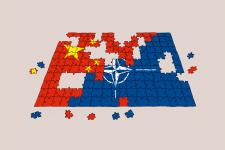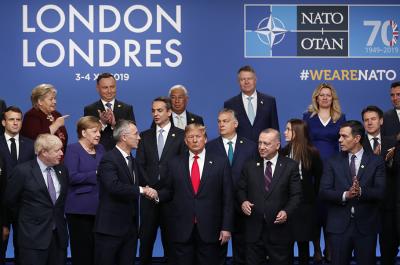Mikkel Runge Olesen

The Biden administration is likely to adopt a less chaotic US approach to the NATO alliance concerning China. European members should utilize this calmer time to develop viable strategies on how to tackle non-conventional threats from China within the Alliance in concert with the US.
■ Continue to develop their own strategies and procedures against non-conventional Chinese threats in the domains of cyber, influence activities, and trade and investments.
■ Resist the temptation to fall into inertia in determining how NATO should deal with China after the fear of a US withdrawal from NATO has subsided.
■ Work with the Biden administration to develop NATO’s role in relation to China further on grounds that are acceptable on both sides of the Atlantic.
At the December 2019 NATO summit, the Alliance announced for the first time that it now considered China’s rise a potential challenge to NATO. While the proclamation attempted to show balance by also mentioning China as an opportunity, the fact that NATO now recognizes China as a potential challenge, one that is worth mentioning in the alliance’s official communiqué from the leaders’ summit, represents a major shift: it signals that the days when Europe could hope to sit out US-Chinese great-power rivalries may now be coming to an end.
In fact, the change has been long underway, starting within the US itself. In 2001, the Bush administration had only just begun to consider the security implications of the rise of China when September 11 suddenly shifted its focus to the War on Terror for the rest of the decade. In a similar fashion, the Obama administration’s pivot to Asia in 2011 was abruptly upset by the Russian annexation of Crimea in 2014.
Most recently, the Trump administration has again shifted the focus to China. This time around, however, this focus seems to be more enduring. Furthermore, whereas earlier administrations may have been satisfied with the Europeans simply doing more in their own region, this time around, the US expects much more direct and concrete support from its allies regarding China. While some critics fear that Biden’s disdain for China’s dictatorship might lead him to underestimate China or that his need to focus on his domestic agenda will distract him from dealing with it, there is little reason to think that it will lead him to change the US’s general approach to China: in the long run, the US will continue to focus on China and will continue to expect European involvement.
We recognise that China’s growing influence and international policies present both opportunities and challenges that we need to address together as an Alliance NATO, London Declaration, December 4, 2019
As a consequence of US pressure, moreover, NATO has moved relatively quickly on China. Just a few years ago, few would have expected NATO’s European members, many competing to attract Chinese investments at the time, to allow NATO even to mention China in geopolitical terms. Today, we see an organization focusing increasingly on China, prodded by its own secretary general, Jens Stoltenberg. The London declaration’s talk of challenges in December 2019 was just the beginning in that respect. At the Brussels Forum in June 2020, Stoltenberg went so far as to include China as one of the new threats the Alliance faced, not yet directly against a NATO ally, but as a consequence of its rise more generally. He gave as reasons the country’s growing capabilities across the military spectrum and its behaviour in its near abroad.
The China threat
So, what is at stake for the Alliance, and how is the China threat viewed from the different sides of the Atlantic? The fact is that in dealing with China, US and European interests and threat perceptions tend to overlap, but they do not mesh completely. In terms of US security policy, China is the new global challenger to US global hegemony. In addition, US interests and alliances in Southeast Asia make the rise of China a potential threat to the US across all parameters, including both conventional military aspects and non-conventional aspects such as diplomatic measures, influence activities, cyber operations and economic means.
 NATO heads of government gathered at the NATO Summit in London on December 4. 2019. Foto: Adrian Dennis/AFP/Ritzau Scanpix
NATO heads of government gathered at the NATO Summit in London on December 4. 2019. Foto: Adrian Dennis/AFP/Ritzau ScanpixFor the Europeans in NATO, conversely, China is not a conventional military threat comparable to next-door Russia. However, European leaders are becoming increasingly concerned about China’s ability to wield influence in Europe across the non-conventional axis of threat. In this respect, economic measures, including China’s acquisition of key infrastructure in Europe, influence activities and capabilities in the cyber domain are currently of greatest concern.
At the same time, Chinese trade practices are increasingly being scrutinized. All this means that, while Chinese investments are still widely sought in Europe, the appetite is significantly less than it was just five years ago.
While the US may welcome the involvement of select European powers such as the UK and France in the South China Sea, thus far we have not seen US calls for a direct NATO military presence in China’s immediate neighbourhood. Instead, NATO’s focus on China is gearing up to be placed on the non-conventional threats connected with China’s rise. This is perhaps not surprising, being simply an expression of where a transatlantic consensus can most easily be achieved. However, it raises the question why pursue such cooperation in NATO, an alliance initially founded to protect its members against a conventional military threat?
Political burden-sharing in NATO
Clearly NATO has evolved since the end of the Cold War. Its ability to address non-conventional threats has been sharpened by dealing with Russian hybrid warfare since the outset of the Ukraine Crisis in 2014. Nevertheless, the NATO shift is at least as deeply motivated by alliance politics as by any operational concerns. This has to do with the concept of burden- sharing in NATO, understood as a debate over how the burdens connected with collective defence should be distributed on both sides of the Atlantic.
Ever since the founding of NATO, this debate has been driven by higher US defence spending and US displeasure with the lower spending of its allies. That is still the case today. This is a key foundation for the Wales Summit pledge of 2014, when the allies committed themselves to aiming for defence spending equalling at least 2% of their respective GDPs by 2024. But it has also often come with a political element, where the allies – especially those who spend less on defence – have been able to show their support for the US in alternative ways, for example, through contributions to US military operations abroad. In a similar fashion, showing solidarity with the US regarding China is in many ways set to be the next big thing in terms of political burden-sharing in the NATO alliance.
This has especially been the case in the Trump era, when European fear of Trump pulling out of NATO has driven both the 2% spending debate and the debate over whether NATO should take on a role in dealing with China. For all the damage done to the transatlantic bond by Trump’s treatment of his NATO allies in general, his seeming willingness to dismantle NATO altogether has provided him with a uniquely strong bargaining position on both the 2% issue and NATO’s role regarding China. According to a NATO press release from October 2020, European and Canadian defence spending has been rising at a speed of between 3.7 to 6% per annum during the Trump presidency. In the same way, it has empowered the Trump presidency to put China on NATO’s agenda.
Where does this leave NATO in the Biden era? US interests in having its allies do more on China are likely to remain. However, without the credible threat of an imminent US NATO exit – not to mention the possibility that the Biden administration might initially be distracted by domestic affairs related to managing the COVID 19 crisis – the recent frantic drive in NATO to deliver on China will likely give way to a slower transition period. The European NATO allies would do well to take advantage of this slowdown to conduct deeper strategic analyses of what to do about China, lest they have to rush everything once more if and when the next ‘America First’ president takes office.
Mikkel Runge Olesen is a senior researcher at the Danish Institute for International Studies (mro@diis.dk)
No comments:
Post a Comment